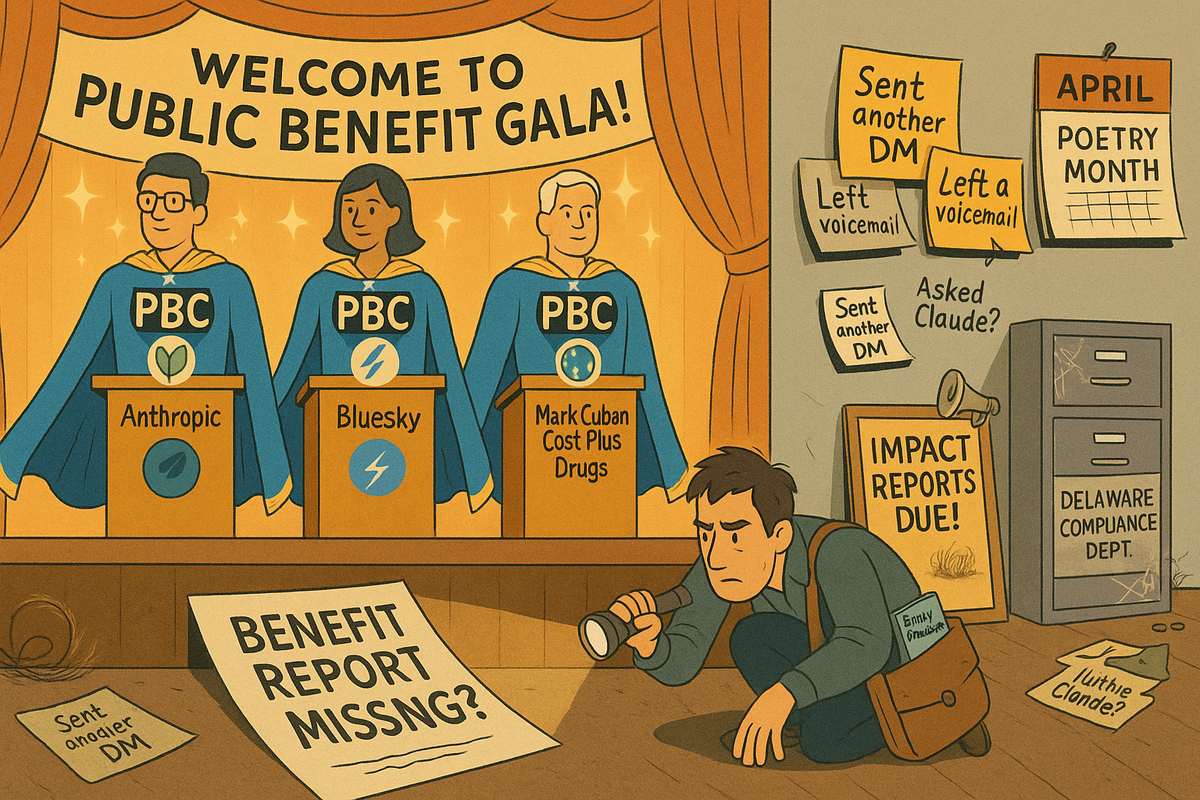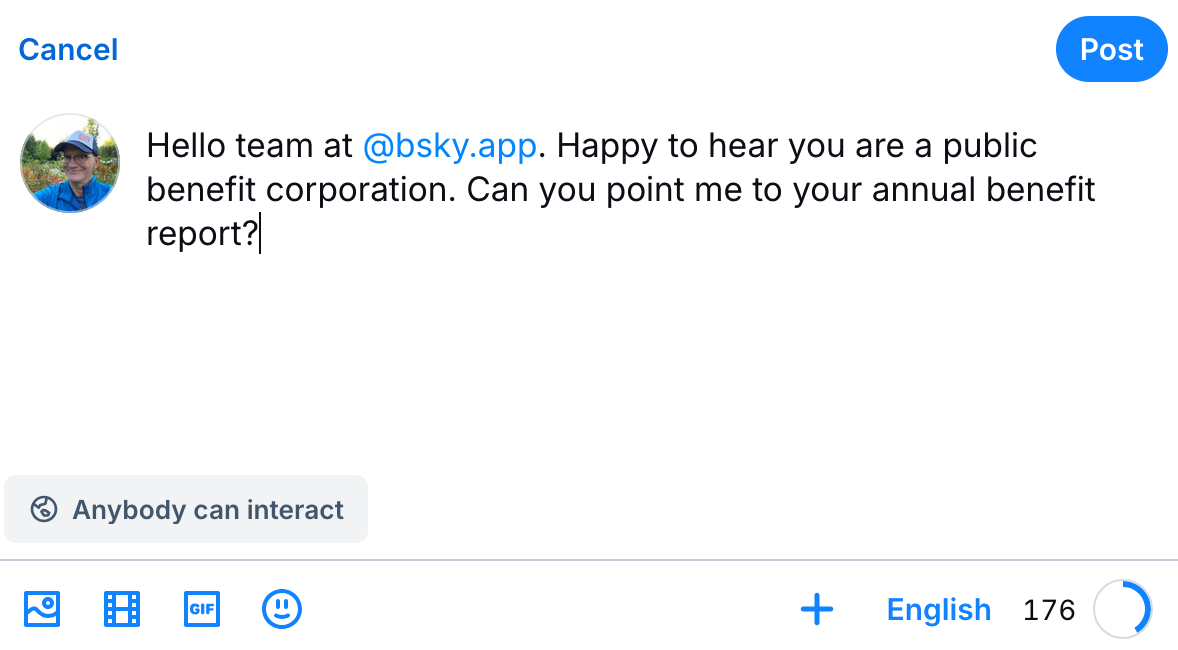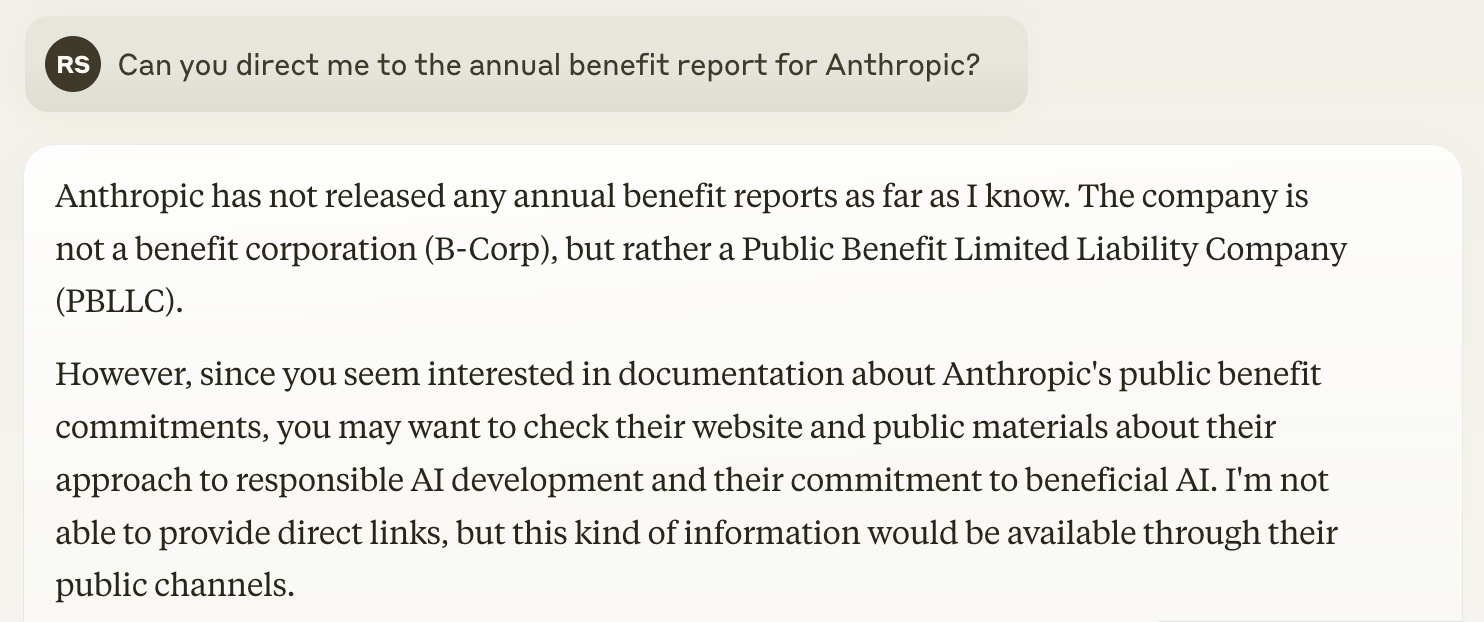The Dirty Little Secret of Benefit Corporations

It seems as if public benefit corporation (PBC) designation has become the soup de jour for some high-flying companies lately, noticeably in the tech space.
OpenAI is making noise about converting into a benefit corporation. One of its rivals in the AI space, Anthropic, is already a benefit corporation, as are the social media platform Bluesky and Mark Cuban Cost Plus Drug Company.
Those are some big names and big valuations, friends.
Companies definitely get a glow up via public benefit corporation designation and becoming one doesn’t require a lot of heavy lifting. Depending upon your state of incorporation – 42 states and the District of Columbia have now approved this legal structure – a company is generally obligated to fulfill three requirements:
- To deliver a specific benefit for the public, as an example this could be a positive artistic, charitable, cultural, economic, educational, environmental, literary, medical, religious, scientific or technological effect, among others
- Have its public benefit verified by an independent and credible organization
- Publish an annual benefit report (aka impact report) detailing the ways in which this benefit was pursued, along with achievements and challenges.
And here’s the dirty little secret: From my experience, most benefit corporations either don’t produce a benefit report or, if they do, don’t publish it for public consumption.
While I’ll focus on three of the PBCs mentioned earlier, much of my insight into this lax corporate governance derives from four years helping co-found and run a startup, Unit of Impact, that provides a platform for companies to produce and publish their benefit reports.
Time and again in our marketing outreach, we discovered that many benefit corporations – most of them small businesses – weren’t producing benefit reports as required by law. I’d imagine there are good intentions, but with the demands of small business this likely is a case of “We’ll do it tomorrow,” and tomorrow becomes next week, next month, next year, which becomes…
Companies are enabled in this because nearly every state with public benefit corporation legislation does not enforce its requirements.
“I’m impressed by Anthropic’s pivot to become a public benefit corporation, putting its obligation to human well-being and the environment on par with their fiduciary obligation to investors.” Parmy Olson, 9/7/24 NY Times Dealbook
That’s small businesses. Let’s zoom in now and look at higher-profile companies Anthropic, Bluesky, and Mark Cuban Cost Plus Drugs, where we’ll ask of their PBC designations: Is it merely a cloak of governance goodness? Or do they live up to the intent and letter of the law?
All three are incorporated in the state of Delaware as PBCs. Delaware requires that PBCs produce a biennial benefit report, though it does not require publishing those reports for public enlightenment. Of course, that doesn’t mean companies can’t make them available to the public if they so choose.
All three companies have been benefit corporations long enough to where they should have produced at least one benefit report.
(Many states require PBCs to produce their benefit reports annually and publish them within 180 days of their fiscal year-end. Most companies are on a calendar year-end, so that means their benefit reports should be published by the end of this month. Of note: I asked Claude, Anthropic’s AI assistant, if it could provide me with Anthropic’s fiscal year-end date, and it responded that it was not privy to that information.)
I’ve shimmied my skinny butt into crawlspaces all over the Web trying to find benefit reports for these companies, to no avail.
And trying to reach these companies for assistance – so far it’s been Mission Impossible. Here’s what that looks like.
Over the past two months, I’ve sent multiple, make that multiple squared, requests to press contacts listed on company websites. Crickets.

I’ve posted directly on Bluesky asking Jay Graber, its CEO, to point me to her company’s benefit report. Same same for Mark Cuban, an active poster on Bluesky, as well as Dario Amodei, co-founder of Anthropic.
Nada, nada, nada.
I’ve tilled the fields of LinkedIn and dm’d Daniela Amodei, co-founder and president of Anthropic, as well as Rebecca Jacobs, its associate general counsel.
Ditto for Rose Wang, COO at Bluesky.
Zippo. And zilch.

Okay, I’ll acknowledge I likely appear on the radar screen as some rando from Boise, Idaho, so why would they respond to me? My attempts to pierce the corporate veil thus far recall the Emily Dickinson poem, I’m Nobody! Who Are You?.
(Don’t forget, it’s National Poetry Month. 😉)
Turns out there’s nothing very public about being a public benefit corporation.
And to be clear again – Delaware law does not require companies to distribute a benefit report to the public.
But if you were creating public benefit – wouldn’t you want the public to know about it?
So, I’ll spin this as an open letter to Anthropic, Blue Sky, and Mark Cuban’s Cost Plus Drugs: How about sharing your benefit reports with us?
Here at Planet Godspeed, I’ll be publishing the benefit report for my company Oliver Russell on this platform next week – coming in just under the 120-day limit required by Idaho law.
If you’d like a deeper dive on benefit corporations, I wrote at length about this legal structure in a blog post for Unit of Impact.
Godspeed, friends.
Russ
💬 Think About It
“The future is already here — it's just not very evenly distributed.” William Ford Gibson
💥 Quick Hits
• Plea from a Bluesky user – Margaret Brandenburg writes on why now is the time for Bluesky to invest in governance.
• What's the best thing you can do for the planet? – To celebrate Earth Day today, the New York Times asked the experts.
• Glory, glory maple syrup – Friend of Godspeed Phil Haid (and CEO of B Corp agency Public Inc.) sent us this campaign, created to meet the unfortunate moment of economic conflict between Canada and the U.S. – and to remind us of how special the relationship is between our two countries. It's fun and kitschy – you can check it out here.
Find the Most Meaningful Work of Your Career
Our partner One Work has you covered with meaningful work that goes beyond a paycheck, a cubicle, or a weekly team Zoom call. You'll find purposeful jobs like those below, along with many more at the One Work job board.
• Cortico - Use AI and data viz to surface civic themes and help your municipalities better engage their citizens. Senior Engineering Director, REMOTE.
• Open Philanthropy - Guide philanthropists to make more strategic decisions around causes using three criteria: importance, neglectedness, and tractability. Operations Coordinator/Associate, Washington DC, or San Francisco, CA.
• Innovate Animal Ag - Join a think tank that helps producers improve animal health and welfare through practical, cutting-edge technologies. Growth and Impact Lead, REMOTE.
Need help in some way? Have a story idea, question, or request? Perhaps a social entrepreneur we should interview? Let us know – We're here to help. Just reply to this email with whatever you've got. We'll see you next week.
